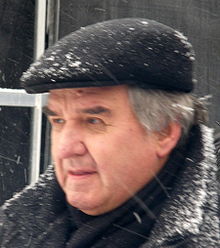Linnart Mäll
Linnart Mäll (born June 7, 1938 in Tallinn , Estonia , † February 14, 2010 in Tartu ) was an Estonian historian , orientalist , translator and politician .
biography
Studies and Scientists
After schooling, he studied history at the State University of Tartu (Tartu Riiklik Ülikool) and graduated in 1962 with the graduation from. He then completed postgraduate studies from 1964 to 1966 at the Institute of Oriental Studies of the Academy of Sciences of the USSR and from 1966 to 1969 at the History Faculty of the Tartu State University. It was there that he obtained his doctorate in philosophy ( Ph.D. ) in 1985 .
From 1969 he was a lecturer at Tartu State University until he was released from this position in 1973 because of anti-communist tendencies. Afterwards, however, he remained an employee of the local department for oriental studies until 1983 and was then head of the department for semiotics and history from 1983 to 1991. After that he was head of the Department of Oriental Studies at the University of Tartu until 1994.
As a scientist, Mäll had a wide range of fields of activity and research topics such as texts by Buddha and the mythology of Buddhism , Indian culture and Chinese literature . His interest in Buddha and Buddhism was inspired by the theologian and philosopher Uku Masing in the early 1960s . He continued this interest through study and research work with Nikolai Konrad, Alexander Piatigorsky and Oktiabrina Wolkowa.
Mäll applied the semiotic analysis method early on in the study of Buddhist texts and general oriental thoughts and literature. His progressive ideas made him one of the leading scholars for oriental studies at the School of Semiotics in Moscow in the late 1960s and early 1970s .
Chairman of the UNPO and politician
When the Soviet Union began to dissolve , he was elected a member of the Congress (Eesti Congress), the transitional parliament, in 1990 and was a member of it until 1991. He was then a member of the Estonian Constituent Assembly from 1991 to 1992.
On February 11, 1991 Mäll, who was also interested in the history and peoples of smaller states, was a founding member and until 1993 first chairman of the Organization of Unrepresented Nations and Peoples Organization (UNPO). In 1993 he became Deputy Secretary General of the UNPO for Eastern Europe and, as such, was director of the UNPO Coordination Office in Tartu for ten years . During this time he was the leading person of the UNPO for Eastern Europe until 2003 and also for the coordination and planning of events of the organization such as the "Third Regional Conference for Eastern Europe", which dealt with the issues of economic and political cooperation in the region and the process the dissolution of the Soviet Union.
At the same time he worked on the preparation and conception of texts on humanism and human rights . He expanded this activity in 1998 with the initiation of the project "Humanistic base texts in the History of Mankind", of which he was also the director. In addition to this activity, he was the author of ten books and over a hundred specialist articles on this subject.
Between 1992 and 1994, Mäll was also chairman of the Estonian National Independence Party (Eesti Rahvusliku Sõltumatuse Party) and in 1992 the founder of the Pan-European Union of Estonia, of which he was president until his death.
In 1994 he was appointed director of the Institute for Oriental Studies at the University of Tartu.
In 2001 he was awarded the Order of the White Star 4th degree for his services .
Web links
| personal data | |
|---|---|
| SURNAME | Mäll, Linnart |
| BRIEF DESCRIPTION | Estonian politician, orientalist and historian |
| DATE OF BIRTH | June 7, 1938 |
| PLACE OF BIRTH | Tallinn |
| DATE OF DEATH | February 14, 2010 |
| Place of death | Tartu |
